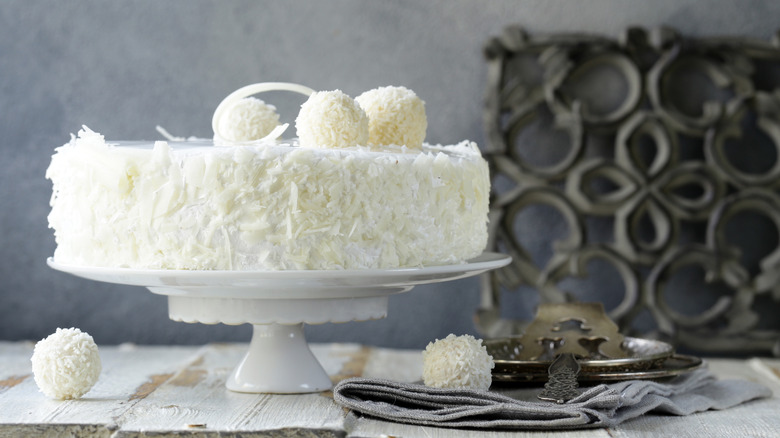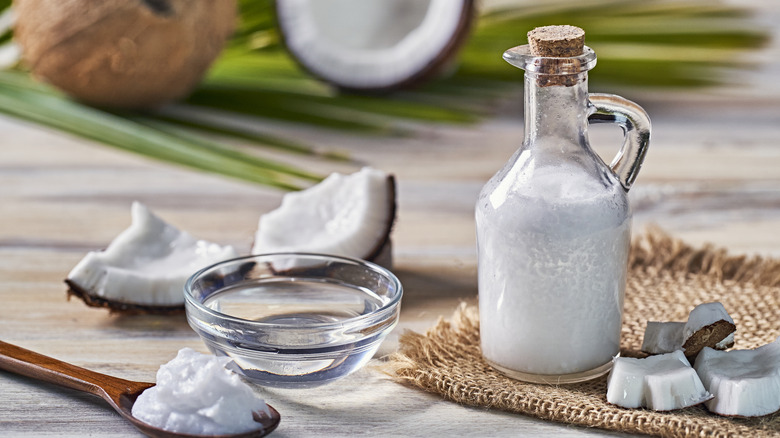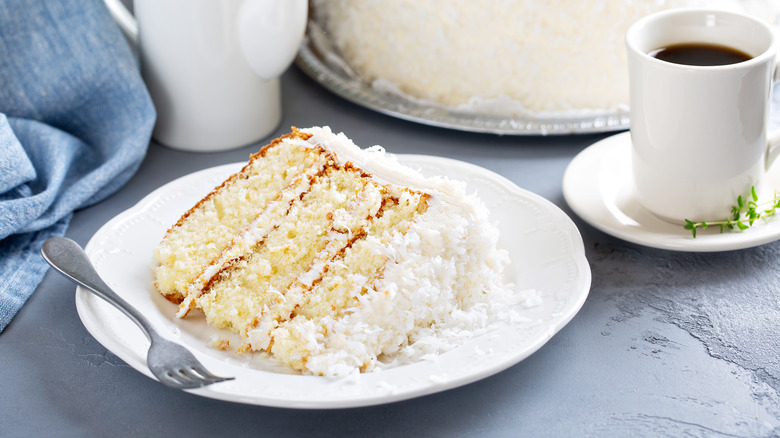For The Best Coconut Layer Cake, Your Oil Choice Matters
If you want to set the bar extra high for your next homemade birthday cake, or any special occasion for that matter, skip all of the other recipes and go directly for a coconut layer cake. They're beloved in the American South, and for good reason. Who wouldn't love layers of sweet, nutty coconut crumb frosted with coconut-scented frosting? Sprinkle the whole thing with a layer of shredded coconut and it's a show-stopper. Coconut is somewhat of a tough flavor to nail down in a cake, however, so it's important to choose your cake ingredients carefully; everything needs to bring some coconut aroma to the table. One of the easiest ways to get that tropical essence into a coconut cake recipe is to swap out a portion of the plain vegetable oil or butter with virgin coconut oil.
Virgin coconut oil retains a lot of the delicate aroma and flavor of the fruit because it hasn't been processed and refined. When you use it in a cake batter, it will give the finished cake a more complex, multidimensional coconut flavor. The trick is to make sure you buy the good stuff.
Look for cold-pressed, virgin coconut oil
Coconut is prized for its mild, nutty-but-sweet flavor that brings an island vibe to everything from cocktails to cookies. While we all know exactly how it should taste, it's actually not that easy to make something taste like coconut, especially when you're baking a cake from scratch. If you only rely on adding shaved coconut to the batter, or a dash of coconut extract, your finished cake won't have a very strong coconut flavor. What you really need to do is build the coconut flavor from the base — the cake itself — by using virgin coconut oil to mix the batter.
Virgin coconut oil, which is also labeled as unrefined coconut oil, is made with less processing than refined coconut oil, which allows it to retain more of its aroma, flavor, and other vital nutrients. Refined oil is processed in a way that intentionally strips away much of the coconut flavor and aroma, so that's out. What you want to look for is cold-pressed oil, which is made without any heat (hence the name). If you've ever stuck a spoon or a finger into a container of coconut oil and tasted some flavor, it was probably unrefined, cold-pressed coconut oil. Some unrefined coconut oils have gone through expeller pressing, which uses steam or heat to extract the oil from the coconut meat. This can destroy the fragile aroma and flavor molecules in the oil as well, so it's a good idea to avoid those bottles for the purpose of making a cake.
Using coconut oil in a cake
Swapping virgin coconut oil into a cake recipe is easy, especially if the recipe calls for butter. This is because unrefined coconut oil is solid at room temperature just like butter, so it has many of the same creaming qualities as butter. For the best results, you can substitute half or all of the butter in a basic vanilla cake recipe for coconut oil, and your cake will rise properly.
Virgin coconut oil also comes in handy when it's time to make the frosting. You can swap out some of the butter in a buttercream frosting recipe for coconut oil, which will give it some complex coconut flavor the same way it can do for your cake. For even more coconut flavor in the cake itself, you can also experiment with subbing in coconut milk for regular milk, and coconut flour for regular flour. After decorating with your coconut-infused frosting, all that's left to do is assemble the cake, cover it with toasted coconut flakes, and give it a taste — just to make sure it's got all the extra flavor, of course.


